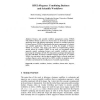142
click to vote
ICSOC
2010
Springer
15 years 18 days ago
2010
Springer
Business and scientific workflow management systems (WfMS) offer different features to their users because they are developed for different application areas with different require...
151
click to vote
SIGMOD
2008
ACM
15 years 2 months ago
2008
ACM
Provenance in the context of workflows, both for the data they derive and for their specification, is an essential component to allow for result reproducibility, sharing, and know...
146
click to vote
ITSSA
2006
15 years 2 months ago
2006
: This paper investigates the use of the Business Process Execution Language for Web services (BPEL4WS/ BPEL) for managing scientific workflows. The complexity, unpredictability an...
136
click to vote
COMPUTER
2007
15 years 2 months ago
2007
Workflows have recently emerged as a paradigm for representing and managing complex distributed scientific computations and therefore accelerate the pace of scientific progress. A...
128
click to vote
BMCBI
2007
15 years 2 months ago
2007
Background: Scientific workflows improve the process of scientific experiments by making computations explicit, underscoring data flow, and emphasizing the participation of humans...
144
click to vote
HPDC
2010
IEEE
15 years 3 months ago
2010
IEEE
Modern scientific collaborations have opened up the opportunity of solving complex problems that involve multidisciplinary expertise and large-scale computational experiments. The...
134
click to vote
HPDC
2010
IEEE
15 years 3 months ago
2010
IEEE
Large scale bioinformatics experiments are usually composed by a set of data flows generated by a chain of activities (programs or services) that may be modeled as scientific work...
162
click to vote
CCGRID
2010
IEEE
15 years 3 months ago
2010
IEEE
Geo-sciences involve large-scale parallel models, high resolution real time data from highly asynchronous and heterogeneous sensor networks and instruments, and complex analysis a...
157
click to vote
SERVICES
2008
15 years 3 months ago
2008
With the advances in e-Sciences and the growing complexity of scientific analyses, more and more scientists and researchers are relying on workflow systems for process coordinatio...
142
click to vote
CCGRID
2008
IEEE
15 years 4 months ago
2008
IEEE
Selection of resources for execution of scientific workflows in data grids becomes challenging with the exponential growth of files as a result of the distribution of scientific e...



